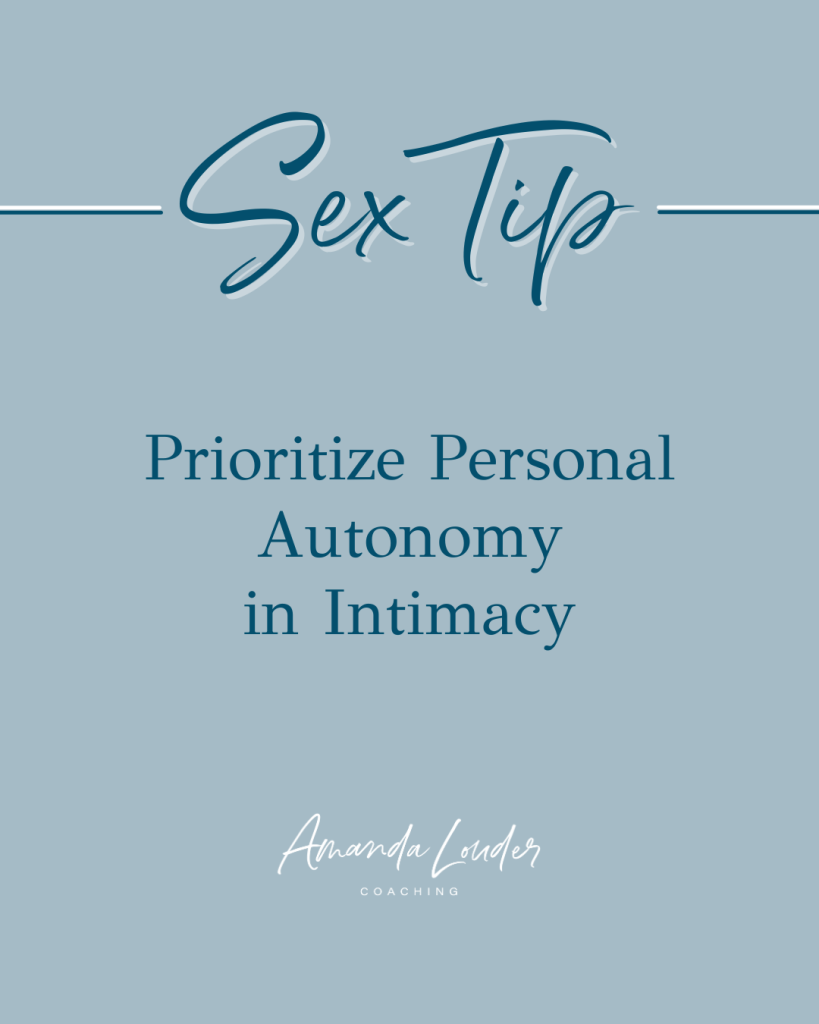
In this episode, I want to talk about a question I get asked all of the time. It’s said in different ways, but it all comes down to this – Why does sex often seem so hard, even when we genuinely want to have it? Have you ever wondered that? Sex is a beautiful, integral part of a healthy marriage, but it’s not uncommon to face challenges in this area, as we all know. So, let’s break down some of the reasons why we might struggle and explore ways to make things better. Are you ready? Let’s go!
Show Notes:
Follow Amanda on Facebook and Instagram.
Join Amanda’s Private Facebook Group.
Show Summary:
Today I wanted to talk about a question I get from many of you: Why does sex often seem so hard, even when we genuinely want to have it? Sex is a beautiful, integral part of a healthy marriage, but it’s not uncommon to face challenges in this area, as we all know. So, let’s break down some of the reasons why we might struggle and explore ways to make things better.
Why Does Sex Often Seem So Hard?
For many women, even those who like it, sex can sometimes feel more like a chore than a pleasurable experience. When it feels like work, our desire to engage diminishes. And if we feel pressured into having sex (whether that is external pressure or internal pressure), it can create a sense of obligation rather than desire. Personal autonomy is crucial for sexual enjoyment. Imagine you’re tired after a long day, and your partner initiates sex. If you feel obligated to comply, it can lead to resentment. This resentment can build up over time, creating a negative association with sex. Instead, it’s important to communicate openly with your partner about your needs and boundaries, ensuring that both of you feel respected and autonomous in your sexual decisions.
Mental Work
Especially for women, the mental preparation required to get in the mood can be daunting, especially when other life stressors are in play. Women often need to be getting their mind and body ready to engage and with everything else going on, that can just seem next to impossible. Here are some other things that play into that:
– Physical Exhaustion: After a long day of work, chores, and possibly wrangling kids, it’s no wonder we’re exhausted. When you’re physically drained, sex can feel like just another task on an already overwhelming to-do list. For instance, a working parent might spend their entire day juggling job responsibilities and childcare, leaving little to no energy for intimacy.
– Physical Pain: Conditions like chronic pain, postpartum recovery, or other health issues can make sex uncomfortable or painful. For example, someone recovering from surgery might feel anxious about having sex due to fear of pain. It’s important to communicate these concerns with your partner and seek medical advice to find ways to make sex more comfortable.
– Stress: Daily stressors from work, finances, or personal issues can weigh heavily on our minds, making it hard to switch gears into a sexy mindset. Picture a scenario where you’re worried about meeting a deadline at work; the last thing on your mind might be getting intimate. Finding ways to manage stress, such as through meditation, exercise, or even talking about your concerns with your partner, can help ease this burden.
– Lack of Time: Our busy schedules often leave little room for intimacy. Imagine a couple with young children who both work full-time. Their evenings might be filled with household chores, helping with homework, and trying to get some much-needed rest. In such cases, finding time for intimacy requires intentional planning.
– Lack of Self-Esteem and Body Image Issues: Feeling uncomfortable or unhappy with our bodies can make us less inclined to engage in physical intimacy. For example, if you’re self-conscious about weight gain, you might avoid sex because you fear your partner’s judgment. Building self-esteem through positive self-talk, self-care, and perhaps professional counseling can help overcome these barriers.
– Relationship Issues: Ongoing conflicts or unresolved issues in the relationship can create emotional distance. If you’re constantly arguing with your partner, it’s hard to feel close enough for intimacy. Working through these conflicts with open communication or coaching can help rebuild your connection.
– Sexual Mismatches: Differences in libido or sexual preferences between partners can lead to frustration. For instance, one partner might have a higher sex drive than the other, leading to feelings of rejection or pressure. Finding a balance that respects both partners’ needs is crucial.
– Parenting Demands: The constant demands of parenting can leave little time or energy for sex. Imagine a couple with a newborn baby who wakes up multiple times a night; their exhaustion can overshadow any desire for intimacy. Finding creative ways to carve out time for each other, even if it’s just a few minutes, can make a difference.
Tips to Make It Better
Understanding the reasons why sex can feel hard is the first step. Now, let’s talk about what we can do to address these issues and make sex a more enjoyable part of our lives.
- Physical Health and Mental Health
First and foremost, we have to understand that our physical health and our mental health directly impact our ability to have pleasure in the bedroom.
– Physical Health: Regular exercise, a balanced diet, and getting enough sleep are foundational. If physical pain is an issue, seeing a healthcare provider for treatment or pain management options can be crucial.
– Mental Health: Stress management techniques such as meditation, coaching, or even just taking time for hobbies can significantly reduce stress. Mental health care should be a priority, as untreated issues like anxiety or depression can heavily impact sexual desire. Consider a scenario where someone’s anxiety is affecting their libido; medication and getting some professional help might help them regain their desire for intimacy.
- Improving Self-Esteem and Body Image
Working on self-esteem and body image is another vital step. Remember, confidence in the bedroom starts with confidence in yourself. For instance, engaging in activities that make you feel good about your body, like exercise or wearing clothes that make you feel attractive, can boost your self-esteem. This is why your relationship with yourself is ALWAYS the first thing we address in coaching.
- Communication
Effective communication with your partner is key. Talk about your needs, desires, and any issues that are affecting your sexual relationship. This includes discussing:
– Expectations: Being on the same page about how often you want to have sex can prevent misunderstandings. For example, if one partner expects sex daily and the other is comfortable with once a week, discussing this openly can help find a compromise.
– Preferences: Knowing what each other likes and dislikes can enhance the experience. If one partner enjoys a particular type of foreplay, sharing this information can improve mutual satisfaction.
– Concerns: Addressing any physical or emotional concerns openly can help you both find solutions. If there’s discomfort during sex, discussing it can lead to finding ways to make it more enjoyable, such as trying different positions or using lubrication.
- Scheduling Intimacy
It might sound unromantic, but scheduling time for intimacy can be incredibly helpful, especially for busy couples. Knowing that you have dedicated time for each other can help build anticipation and make it easier to mentally prepare. For example, setting aside Friday nights as your “date night” can ensure that you prioritize time for intimacy.
- Creating the Right Environment
Setting the mood can also make a big difference. Create a relaxing and inviting environment in your bedroom. This could mean dimming the lights, playing soft music, or ensuring the space is tidy and free from distractions. Imagine coming home to a bedroom with candles lit and soothing music playing – it sets the tone for a more intimate and relaxed encounter.
- Addressing Relationship Issues
If there are underlying relationship issues, consider couples coaching or a couples retreat. Working through conflicts and improving your emotional connection can reignite your physical connection. .
- Balancing Parenting and Intimacy
For parents, finding time for intimacy can be particularly challenging. Consider solutions like:
– Date Nights: Regularly scheduled date nights can help maintain your romantic connection. Even if it’s just ordering takeout and watching a movie together after the kids are asleep, it’s time spent focusing on each other.
– Childcare Swaps: Arrange childcare swaps with friends or family to give you some alone time. For example, you watch your friend’s kids one weekend, and they watch yours the next, giving both couples time for intimacy.
– Quality Over Quantity: Focus on the quality of your intimate moments rather than the quantity. Even short, meaningful connections can strengthen your relationship. A quick but passionate kiss or a few minutes of cuddling can sometimes be enough to maintain intimacy.
Many women put their spouse and marriage on the back burner when raising young children. While very tiny children need you for their survival, it is so important to continue to make your marriage and intimacy a priority.
Conclusion
Remember, you’re not alone in these struggles. Many couples face similar challenges, and understanding the reasons behind them is the first step toward overcoming them. By prioritizing your physical and mental health, improving communication, and taking practical steps to create a more inviting environment for intimacy, you can transform your sexual relationship into a source of joy and connection rather than stress and obligation.
Thank you for joining me today on the Sex for Saints podcast. If you have any questions or topics you’d like me to cover in future episodes, feel free to reach out.





